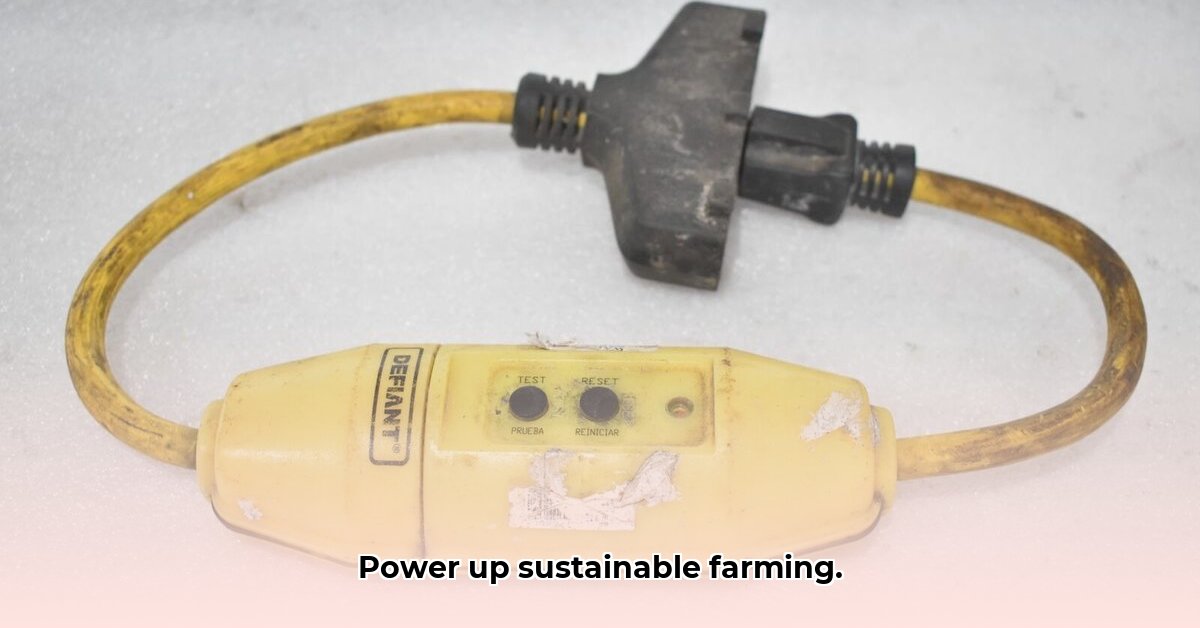
Choosing the Right Extension Cord for Your Sustainable Farm
Reliable power is crucial for modern sustainable agriculture. Electric tools and machinery are quieter, produce fewer emissions, and often offer greater precision than their gas-powered counterparts. But how do you power these tools in the field? This guide helps you select and safely use extension cords from Tractor Supply to power your sustainable farming practices. We'll cover cord types, safe usage, maintenance, and planning to optimize your farm's electricity needs. For more on farm equipment, check out this helpful resource: Tractor Information.
Understanding Extension Cord Specifications: Watts, Amps, and Gauge
Choosing the right extension cord isn't just about length; it's about the power demands of your equipment. The wattage (power) your tools consume determines the cord's required amperage (current) capacity. This, in turn, dictates the appropriate gauge (AWG). A thicker cord (lower AWG number) handles higher amperage and wattage without overheating, preventing damage and ensuring your tools receive full power. Isn't it important to avoid damaging your equipment? A properly chosen extension cord is an investment in longevity.
- Wattage: The power your tool uses (measured in watts). Find this information on the tool's label or manual.
- Amperage: The rate of electrical current flow (measured in amps). You need a cord with sufficient amperage to handle your tool's wattage. The formula is Watts/Volts = Amps (assuming a standard 120-volt system).
- Gauge (AWG): A lower gauge number indicates a thicker wire, capable of handling more amperage. Thicker cords are more durable but less flexible. Consider the tool's wattage and the length of the cord when selecting the appropriate gauge.
Selecting the Perfect Extension Cord from Tractor Supply
This step-by-step guide helps you choose the right extension cord:
- Determine Wattage Requirements: Check your tools' wattage ratings. Add those up if running multiple tools simultaneously.
- Calculate Amperage: Divide the total wattage by 120 (standard voltage) to find the minimum amperage your extension cord must handle.
- Choose the Appropriate Gauge: Use a gauge chart to determine the minimum suitable AWG, based on the calculated amp requirement and anticipated cord length. A lower AWG is better for higher amperage and longer lengths.
- Select the Correct Length: Purchase a cord slightly longer than needed to avoid over-stretching. Excessively long cords can cause voltage drops, reducing tool efficiency.
- Check for Weather Resistance: Farming requires cords rated for outdoor use and resistant to water and UV exposure. Look for labels indicating this.
- Prioritize Durability: Opt for cords with durable construction, reinforced jackets, and strong plugs to withstand harsh farming conditions.
Safe Extension Cord Usage: Preventing Accidents
Safe electrical practices are non-negotiable. Here’s how to minimize risks:
- Regular Inspection: Before each use, thoroughly inspect the cord for damage (cuts, fraying, exposed wires). Damaged cords must be immediately replaced.
- Avoid Overloading: Never exceed the cord's amperage rating. Overloading causes overheating, leading to fires. Use appropriate surge protectors when necessary.
- Protect the Cord: Keep cords away from sharp objects, hot surfaces, and chemicals. Avoid dragging cords across rough terrain; use cord protectors if necessary.
- Keep it Dry: Avoid water contact. Moisture is a significant electrical hazard.
- Unplug Before Maintenance: Disconnect the cord from the power source before making repairs or adjustments to tools.
Maintaining Your Extension Cords for Longevity
Proper maintenance extends the lifespan of your extension cords and enhances safety:
- Coil Carefully: Properly coiling the cord after each use prevents kinks and damage.
- Store in a Dry Place: Store cords in a clean, dry location to prevent moisture damage.
- Regular Cleaning: Wipe off dirt and debris.
By following these guidelines, you can effectively and safely utilize extension cords from Tractor Supply, thereby maximizing the efficiency and sustainability of your farming operations. Remember, a small investment in quality cords and safe practices translates to a significant return in terms of safety and productivity.